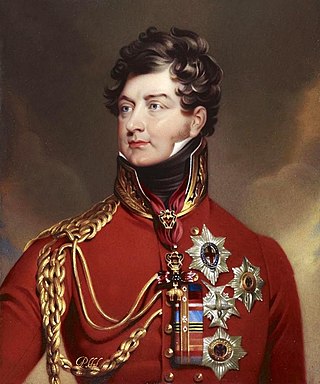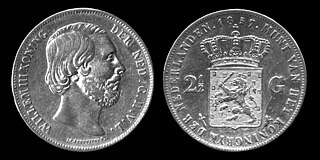Related Research Articles
A monarch is a head of state for life or until abdication, and therefore the head of state of a monarchy. A monarch may exercise the highest authority and power in the state, or others may wield that power on behalf of the monarch. Usually a monarch either personally inherits the lawful right to exercise the state's sovereign rights or is selected by an established process from a family or cohort eligible to provide the nation's monarch. Alternatively, an individual may proclaim oneself monarch, which may be backed and legitimated through acclamation, right of conquest or a combination of means.

A prince regent or princess regent is a prince or princess who, due to their position in the line of succession, rules a monarchy as regent in the stead of a monarch, e.g., as a result of the sovereign's incapacity or absence.

Napoleon II was the disputed Emperor of the French for a few weeks in 1815. He was the son of Emperor Napoleon I and Empress Marie Louise, daughter of Emperor Francis I of Austria. Napoleon II had been Prince Imperial of France and King of Rome since birth. After the fall of his father, he lived the rest of his life in Vienna and was known in the Austrian court as Franz, Duke of Reichstadt for his adult life. He was posthumously given the nickname L'Aiglon.
Grand duke is a European hereditary title, used either by certain monarchs or by members of certain monarchs' families. In status, a grand duke traditionally ranks in order of precedence below an emperor, king, grand prince, archduke, or prince-archbishop, and above a sovereign prince or sovereign duke. The title is used in some current and former independent monarchies in Europe, particularly:

A grand duchy is a country or territory whose official head of state or ruler is a monarch bearing the title of grand duke or grand duchess.
The grand ducal family of Luxembourg constitutes the House of Luxembourg-Nassau, headed by the sovereign grand duke, and in which the throne of the grand duchy is hereditary. It consists of heirs and descendants of the House of Nassau-Weilburg, whose sovereign territories passed cognatically from the House of Nassau to the House of Bourbon-Parma, itself a branch of the Spanish royal house which is agnatically a cadet branch of the House of Capet that originated in France, itself a derivative dynasty from the Robertians and the founding house of the Capetian dynasty.

The Grand Duke of Luxembourg is the head of state of Luxembourg. Luxembourg has been a grand duchy since 15 March 1815, when it was created from territory of the former Duchy of Luxembourg. It was in personal union with the United Kingdom of the Netherlands until 1890 under the House of Orange-Nassau. Luxembourg is the world's only sovereign Grand Duchy and since 1815, there have been nine monarchs, including the incumbent, Henri.

A dynasty is a sequence of rulers from the same family, usually in the context of a monarchical system, but sometimes also appearing in republics. A dynasty may also be referred to as a "house", "family" or "clan", among others.
Regnal numbers are ordinal numbers used to distinguish among persons with the same name who held the same office. Most importantly, they are used to distinguish monarchs. An ordinal is the number placed after a monarch's regnal name to differentiate between a number of kings, queens or princes reigning the same territory with the same regnal name.

Jean was the Grand Duke of Luxembourg from 1964 until his abdication in 2000. He was the first Grand Duke of Luxembourg of French agnatic descent.

Henri is Grand Duke of Luxembourg, reigning since 2000. He is the eldest son of Grand Duke Jean and Princess Joséphine-Charlotte of Belgium, as well as a first cousin of King Philippe of Belgium. In 2019, his net worth was estimated around US$4 billion.
A regnal name, regnant name, or reign name is the name used by monarchs and popes during their reigns and subsequently, historically. Since ancient times, some monarchs have chosen to use a different name from their original name when they accede to the monarchy.

A pretender is someone who claims to be the rightful ruler of a country although not recognized as such by the current government. The term may often be used to either refer to a descendant of a deposed monarchy or a claim that is not legitimate.
A regnal year is a year of the reign of a sovereign, from the Latin regnum meaning kingdom, rule. Regnal years considered the date as an ordinal, not a cardinal number. For example, a monarch could have a first year of rule, a second year of rule, a third year of rule, and so on, but not a zeroth year of rule.

The German Emperor was the official title of the head of state and hereditary ruler of the German Empire. A specifically chosen term, it was introduced with the 1 January 1871 constitution and lasted until the abdication of Wilhelm II was announced on 9 November 1918. The Holy Roman Emperor is sometimes also called "German Emperor" when the historical context is clear, as derived from the Holy Roman Empire's official name of "Holy Roman Empire of the German Nation" from 1512.

The style of the Dutch sovereign has changed many times since the establishment of the Kingdom of the Netherlands due to formations and dissolutions of personal unions, as well as due to marriages of female sovereigns and cognatic successions.
References
- ↑ "Royal Titles | A Guide to Understanding British Nobility". 2023-10-21. Retrieved 2024-07-23.
- ↑ "Luxembourg Head of State | Cour grand-ducale". monarchie.lu. Retrieved 2024-07-23.
- ↑ "Abdication - Meaning, Definition & Edward". HISTORY. 2018-08-21. Retrieved 2024-07-23.